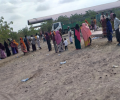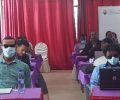 ነፃነታቸውን የተነፈጉ ሰዎች መብቶችን በተመለከተ በኢትዮጵያ የመጀመሪያውን ብሔራዊ ምርመራ ለማካሄድ ከፌዴራልና ከክልሎች የወንጀል ፍትሕ አስተዳደር አካላት ጋር በኢሰመኮ የተዘጋጀ የምክክር መድረክ
ነፃነታቸውን የተነፈጉ ሰዎች መብቶችን በተመለከተ በኢትዮጵያ የመጀመሪያውን ብሔራዊ ምርመራ ለማካሄድ ከፌዴራልና ከክልሎች የወንጀል ፍትሕ አስተዳደር አካላት ጋር በኢሰመኮ የተዘጋጀ የምክክር መድረክ
 Misganaw says the commission will keep appealing to state authorities on the country’s pressing human rights issues but getting an appropriate response may not be immediate, he added.
Misganaw says the commission will keep appealing to state authorities on the country’s pressing human rights issues but getting an appropriate response may not be immediate, he added.
 “As of February 16, 2020, some 920 households are said to have reached Semera where they are seeking protection and humanitarian assistance."
“As of February 16, 2020, some 920 households are said to have reached Semera where they are seeking protection and humanitarian assistance."
 "The release of several detainees since yesterday was a step in the right direction but we remain concerned about unlawful detentions after the lifting of the State of Emergency"
"The release of several detainees since yesterday was a step in the right direction but we remain concerned about unlawful detentions after the lifting of the State of Emergency"
 በሕዝብ እና በየደርጃው ያሉ የመንግስት አካላት በአንድ መድረክ ቀርበው በተለያዩ የሰብአዊ መብቶች ጉዳዮች ላይ መምከራቸው ፈጣን ውጤት ለማምጣት ያስችላል
በሕዝብ እና በየደርጃው ያሉ የመንግስት አካላት በአንድ መድረክ ቀርበው በተለያዩ የሰብአዊ መብቶች ጉዳዮች ላይ መምከራቸው ፈጣን ውጤት ለማምጣት ያስችላል
 በአዋጁ ምክንያት የታሰሩ ሰዎች እንዲፈቱ ከጠየቁት መካከል የአሜሪካ መንግሥት እና የኢትዮጵያ ሰብዓዊ መብት ኮሚሽን ይገኙበታል።
በአዋጁ ምክንያት የታሰሩ ሰዎች እንዲፈቱ ከጠየቁት መካከል የአሜሪካ መንግሥት እና የኢትዮጵያ ሰብዓዊ መብት ኮሚሽን ይገኙበታል።
 ኮሚሽኑ በአስቸኳይ ሁኔታ ወቅት ከአዋጁ አተገባበር ጋር ተያይዞ በቁጥጥር የዋሉ እና አሁንም ያልተለቀቁ ሰዎች በአፋጣኝ እንዲለቀቁ በድጋሚ ያሳስባል
ኮሚሽኑ በአስቸኳይ ሁኔታ ወቅት ከአዋጁ አተገባበር ጋር ተያይዞ በቁጥጥር የዋሉ እና አሁንም ያልተለቀቁ ሰዎች በአፋጣኝ እንዲለቀቁ በድጋሚ ያሳስባል
 Belain Gebremedhin, Director, Disability Rights and Rights of Older Persons Department, said “the session is part of a broader mainstreaming strategy that includes appointment of focal persons or, as we like to call them, ‘ambassadors’, in all of our departments”
Belain Gebremedhin, Director, Disability Rights and Rights of Older Persons Department, said “the session is part of a broader mainstreaming strategy that includes appointment of focal persons or, as we like to call them, ‘ambassadors’, in all of our departments”
 የኢትዮጵያ ሰብዓዊ መብቶች ኮሚሽንና በተባበሩት መንግሥታት ድርጅት ከፍተኛ የሰብዓዊ መብቶች ኮሚሽነር ጽሕፈት ቤት ጣምራ ምርመራ ቡድን ያቀረባቸውን ምክረ ሐሳቦች ተግባራዊ እንዲደረጉ ሥራ መጀመሩን አስታወቁ።
የኢትዮጵያ ሰብዓዊ መብቶች ኮሚሽንና በተባበሩት መንግሥታት ድርጅት ከፍተኛ የሰብዓዊ መብቶች ኮሚሽነር ጽሕፈት ቤት ጣምራ ምርመራ ቡድን ያቀረባቸውን ምክረ ሐሳቦች ተግባራዊ እንዲደረጉ ሥራ መጀመሩን አስታወቁ።
 በምሥራቅ ሸዋ ዞን ቦሰት ወረዳ ውስጥ በከረዩ ሚችሌ ገዳ አባላት ላይ የተፈፀመውን ግድያ ተከትሎ ሁለት ተጠርጣሪዎችን በቁጥጥር ሥር አውሎ ምርመራ እያካሄደ መሆኑን የኦሮሚያ ፖሊስ ኮሚሽን አስታውቋል።
በምሥራቅ ሸዋ ዞን ቦሰት ወረዳ ውስጥ በከረዩ ሚችሌ ገዳ አባላት ላይ የተፈፀመውን ግድያ ተከትሎ ሁለት ተጠርጣሪዎችን በቁጥጥር ሥር አውሎ ምርመራ እያካሄደ መሆኑን የኦሮሚያ ፖሊስ ኮሚሽን አስታውቋል።